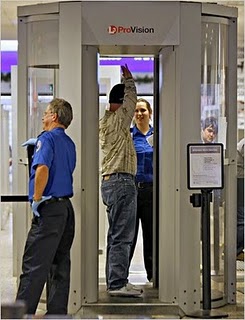By Luis de Grandes MEP, Transport Committee
Civil aviation security is without a doubt one of the major concerns of the European Union. Since 2002, EU legislation has therefore been evolving in order to guarantee the greatest level of security for European citizens – yet not at any price.
This is why the European Parliament will now discuss proposals I have made on protecting the passenger’s fundamental rights and at the same time providing new technology to prevent any possible attack.
Background: 2008, the EC proposal
When the European Commission came to the Parliament in 2008 with a proposal for a regulation on body scanners, the Parliament rejected their inclusion as a new method of screening passengers because there were no guarantees on the respect of human rights.
Four years later, after a further Communication from the European Commission, an impact assessment and the evolution of the scanners themselves, the Parliament has agreed on a clear message. There is added-value in terms of security, together with full respect of human rights.
Parliament’s view: the main points of my report
Security Scanners
There is a need for common EU rules, procedures and standards on security scanners that will not only set standards for detection performance but also impose the necessary safeguards to protect health and fundamental rights. Why? Scanners are already in use in several airports on a trial basis, so EU law needs to set the highest level of operational rules on security scanners, based on the best technologies currently available, to secure passengers’ rights.
I believe that in order to do so, there are several principles which should apply:
- Security scanners must not be harmful to passengers’ health. There is a clear message from the Parliament regarding this issue: any form of ionising radiation should not be permitted in scanners.
- Security scanners must not process any type of body image whatsoever. In this regard, stick figures are the best option.
- Security scanners must guarantee data protection. Linked to the previous idea, data will be protected and there will not be any way of storing images, because no body image will be displayed. The maximum level of data protection is therefore achieved.
The right to reject
Passengers must be allowed to refuse to undergo this type of scanning – but on the understanding that they must then be subject to other kinds of security checks which could be more complicated or lengthy.
Information to passengers and the need for a better training of security staff
I believe that information to passengers on the type of scanners and how they will be treated under the new screening process is essential.
Liquids, aerosols and gels
The situation concerning liquids has suffered many changes. According to EU Regulation 297/2010, liquids obtained at a third-country airport can be carried by passengers from 29 April 2011. From 29 April 2013 any liquids at all can be carried by passengers. Nevertheless, the juridical situation is currently ambiguous, since only a few Member States have applied the regulation. On April 29 2011, the Commission announced the Regulation would, as a result, not be fully applied. They will have to answer to MEPs for this change on 24 May at a debate in Parliament’s Transport Committee.
I believe that, in accordance with EU legislation, from 2013 the ban on carrying liquids should be transformed into an obligation to screen them. Therefore I’m asking all parties concerned to do whatever is necessary to achieve this goal. Again security must be assured, but also to the benefit of passengers.
Cargo and mail
Successive terrorist alerts, first in the United Kingdom, when an explosive package was found on a cargo plane, and subsequently in Greece, when the Greek police intercepted a number of parcel bombs addressed to a senior figure and various embassies in Athens, have obliged the EU to take measures in proportion to the new risks that have been detected.
In this field, I again urge all parties involved to do the necessary to implement the action plan adopted on 2 December 2010, which increases the level of security and recalls that not only harmonization is necessary, but improving coordination with third countries and raising global standards should be the main goals for the EU nowadays.
I believe this report has accomplished the task of setting new EU rules, procedures and standards for new technology and the necessity of guaranteeing the rights of EU passengers. That is to say, the need to protect citizens at all levels but not at any price.
Source – EPP Group at the European Parliament


No responses yet